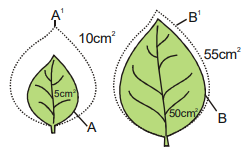Consider the following statements:
| I. | Growth in plants occurs by cell division and cell enlargement, followed by cell differentiation. |
| II. | Growth in plants is generally limited to regions of growing points known as meristems. |
1. Both are correct and II explains I
2. Both are correct but II does not explain I
3. I is correct but II is incorrect
4. I is incorrect but II is correct
Subtopic: Growth |
57%
From NCERT
To view explanation, please take trial in the course.
NEET 2026 - Target Batch - Vital
Hints
To view explanation, please take trial in the course.
NEET 2026 - Target Batch - Vital
Two leaves with respective growth are depicted below.

Consider A' and B' or final size after growth. Which of following statement explain the above situation appropriately :-
| 1. | Relative growth rate of A is twice as that of B relative growth rate |
| 2. | Absolute growth rate is same in A and B |
| 3. | Absolute growth rate of B is 1/10 of A absoulate growth rate |
| 4. | Relative growth rate of B is same as A relative growth |
Subtopic: Growth |
67%
From NCERT
To view explanation, please take trial in the course.
NEET 2026 - Target Batch - Vital
Hints
To view explanation, please take trial in the course.
NEET 2026 - Target Batch - Vital
| Assertion (A): | Plants retain the capacity for unlimited growth throughout their life. |
| Reason (R): | Plant growth is unique. |
| 1. | Both (A) and (R) are True and (R) correctly explains (A) |
| 2. | Both (A) and (R) are True but (R) does not correctly explains (A) |
| 3. | (A) is True but (R) is False |
| 4. | Both (A) and (R) are False |
Subtopic: Growth |
62%
From NCERT
To view explanation, please take trial in the course.
NEET 2026 - Target Batch - Vital
Hints
To view explanation, please take trial in the course.
NEET 2026 - Target Batch - Vital
| Assertion (A): | r is the relative growth rate in plants but cannot be used to calculate efficiency index. |
| Reason (R): | The final size of W1 depends on the initial size W0 during plant growth. |
Choices for Assertions and reasons:
| 1. | Both (A) and (R) are true and (R) is the correct explanation of (A). |
| 2. | Both (A) and (R) are true, but (R) is not the correct explanation of (A). |
| 3. | (A) is true, but (R) is false. |
| 4. | (A) is false, but (R) is true. |
Subtopic: Growth |
68%
From NCERT
To view explanation, please take trial in the course.
NEET 2026 - Target Batch - Vital
Hints
To view explanation, please take trial in the course.
NEET 2026 - Target Batch - Vital
| Assertion (A): | Growth is measured by a variety of parameters like an increase in fresh weight, dry weight, length, area, volume, and cell number. |
| Reason (R): | These quantities are proportional to protoplasm. |
| 1. | Both (A) and (R) are True and (R) correctly explains (A) |
| 2. | Both (A) and (R) are True but (R) does not correctly explains (A) |
| 3. | (A) is True but (R) is False |
| 4. | Both (A) and (R) are False |
Subtopic: Growth |
From NCERT
To view explanation, please take trial in the course.
NEET 2026 - Target Batch - Vital
Hints
To view explanation, please take trial in the course.
NEET 2026 - Target Batch - Vital
| Assertion (A): | Expansion of leaf is growth. |
| Reason (R): | Growth is reversible permanent increase in size of an organ or its parts. |
| 1. | Both (A) and (R) are true and (A) is the correct explanation of (A). |
| 2. | Both (A) and (R) are true, but (R) is not the correct explanation of (A). |
| 3. | (A) is true, but (R) is false. |
| 4. | (A) is false, but (R) is true. |
Subtopic: Growth |
83%
From NCERT
To view explanation, please take trial in the course.
NEET 2026 - Target Batch - Vital
Hints
To view explanation, please take trial in the course.
NEET 2026 - Target Batch - Vital
| Assertion (A): | Growth, at an organ level, is principally a consequence of the increase in the amount of protoplasm. |
| Reason (R): | The increase in protoplasm is difficult to measure directly. |
| 1. | Both (A) and (R) are True and (R) correctly explains (A) |
| 2. | Both (A) and (R) are True but (R) does not correctly explains (A) |
| 3. | (A) is True but (R) is False |
| 4. | Both (A) and (R) are False |
Subtopic: Growth |
From NCERT
To view explanation, please take trial in the course.
NEET 2026 - Target Batch - Vital
Hints
To view explanation, please take trial in the course.
NEET 2026 - Target Batch - Vital




